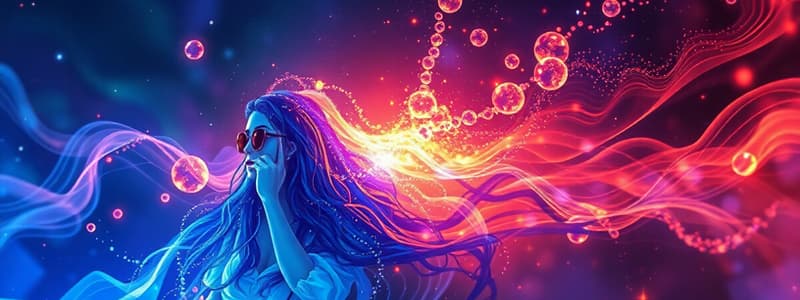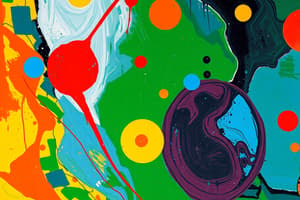Podcast
Questions and Answers
Which statement best describes a solid?
Which statement best describes a solid?
- Its particles are far apart and move freely.
- It has no fixed shape but a defined volume.
- It has a definite shape and volume. (correct)
- It can flow and take the shape of its container.
What distinguishes a chemical property from a physical property?
What distinguishes a chemical property from a physical property?
- Physical properties describe a substance's reactivity.
- Chemical properties can change without altering the substance.
- Chemical properties do not result in the formation of new substances.
- Physical properties can be observed without changing the substance. (correct)
Which of the following is an example of a physical change?
Which of the following is an example of a physical change?
- Melting ice. (correct)
- Combining vinegar and baking soda.
- Baking a cake.
- Rusting iron.
What is the primary characteristic of plasma?
What is the primary characteristic of plasma?
Which of the following best describes a mixture?
Which of the following best describes a mixture?
What does the Law of Conservation of Mass state?
What does the Law of Conservation of Mass state?
Which of the following contains two or more atoms chemically bonded together?
Which of the following contains two or more atoms chemically bonded together?
Which of these is a characteristic of gases?
Which of these is a characteristic of gases?
Flashcards are hidden until you start studying
Study Notes
Definition of Matter
- Matter is anything that has mass and occupies space.
- It includes all physical substances like solids, liquids, and gases.
States of Matter
-
Solid
- Defined shape and volume.
- Particles are closely packed and vibrate in place.
-
Liquid
- Defined volume but no fixed shape.
- Particles are close but can flow past each other.
-
Gas
- No defined shape or volume.
- Particles are far apart and move freely.
-
Plasma
- Ionized gas with free-moving ions and electrons.
- Found in stars, including the sun.
Properties of Matter
-
Physical Properties
- Observable characteristics (color, odor, density, boiling point).
- Can change without altering the substance (e.g., melting ice).
-
Chemical Properties
- Describe a substance's ability to undergo chemical changes (reactivity, flammability).
- Changes result in new substances (e.g., rusting iron).
Composition of Matter
-
Atoms
- Basic building blocks of matter.
- Consist of protons, neutrons, and electrons.
-
Molecules
- Formed by the chemical bonding of two or more atoms.
- Can be elements (e.g., O2) or compounds (e.g., H2O).
Changes in Matter
-
Physical Change
- Alteration of a substance without changing its chemical composition (e.g., freezing water).
-
Chemical Change
- Alters the substance's chemical composition (e.g., baking a cake).
Classification of Matter
-
Pure Substances
- Fixed composition (e.g., elements, compounds).
-
Mixtures
- Combination of two or more substances that retain their individual properties.
- Can be homogeneous (uniform composition) or heterogeneous (distinct phases).
Law of Conservation of Mass
- Matter cannot be created or destroyed in a chemical reaction.
- The mass of products equals the mass of reactants.
Conclusion
- Matter is a fundamental concept in science, encompassing various states, properties, and changes.
- Understanding the nature of matter is essential for studying chemistry and physics.
Definition of Matter
- Matter is anything that has mass and takes up space.
- Examples of matter include solids, liquids, and gases.
States of Matter
- Solids have a fixed shape and volume.
- Liquid has fixed volume but no fixed shape.
- Gases have no fixed shape or volume.
- Plasma is an ionized gas, found in stars like the sun.
Properties of Matter
- Physical properties are observable characteristics, such as color, odor, density, and boiling point.
- Physical changes do not alter the substance's chemical composition.
- Chemical properties describe a substance's ability to undergo chemical changes.
- Chemical changes result in new substances being formed.
Composition of Matter
- Atoms are the basic building blocks of matter.
- Atoms consist of protons, neutrons, and electrons.
- Molecules are formed by the chemical bonding of two or more atoms.
- Molecules can be elements or compounds.
Changes in Matter
- Physical changes alter a substance without changing its chemical composition.
- Chemical changes alter the substance's chemical composition.
Classification of Matter
- Pure substances have a fixed composition, such as elements and compounds.
- Mixtures are combinations of two or more substances that retain their individual properties.
- Mixtures can be homogeneous or heterogeneous depending on whether they are uniform or have distinct phases.
Law of Conservation of Mass
- Matter cannot be created or destroyed in a chemical reaction.
- The total mass of reactants before a chemical reaction equals the total mass of products after the reaction.
Conclusion
- Matter is a fundamental concept in science, encompassing various states, properties, and changes.
- Understanding the nature of matter is crucial for studying chemistry and physics.
Studying That Suits You
Use AI to generate personalized quizzes and flashcards to suit your learning preferences.




